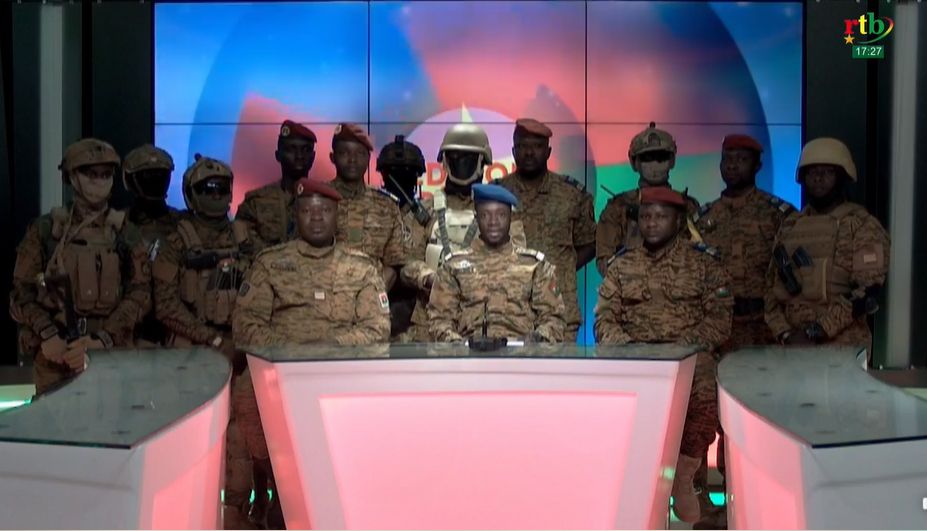
Mutinous soldiers in Burkina Faso declared on state television Monday that they had deposed the government, closed the borders and taken control of the country. President Roch Marc Christian Kaboré has reportedly been arrested.
The big picture: This would be the third successful military coup in west Africa in eight months, after juntas took power last year in Guinea and in neighboring Mali.
- Kaboré has not been seen since an uprising began on Sunday in the capital, Ouagadougou. His whereabouts are unknown, but his party claimed Monday that he had survived an assassination attempt.
- Kaboré has struggled to combat an Islamist insurgency since taking power in 2015. Over 1 million people have been displaced by the fighting and at least 2,000 have been killed.
- Lt. Col. Paul-Henri Sandaogo Damiba signed the televised announcement and is believed to be the coup leader. This would be the eighth successful coup in Burkina Faso since 1960, the most in Africa, per the Washington Post.
Driving the news: In the chaotic 24 hours leading up to the announcement, gunfire rang out at military bases and thousands of protesters took to the street to demand Kaboré's resignation.
- The NYT's Declan Walsh reported from Ouagadougou that there was clear popular support for the coup in the streets.
- He described a somewhat surreal scene of jubilant fans watching the national soccer team secure a major victory in the African Cup of Nations, while elsewhere in the city soldiers occupied a military base and police fired tear gas at protesters.
- Rebellious army officers issued a list of demands on Sunday, including more troops to fight the insurgency, new military and intelligence leadership and better treatment of the families of soldiers who are killed or wounded, journalist Henry Wilkins reported.
Zoom out: Insecurity has fueled political instability across Africa's Sahel region over the past decade. That has accelerated over the past year.
- Mali has seen two coups since 2020, most recently last May. The ruling junta now says it won't hold elections until 2025, sparking stiff sanctions from the ECOWAS regional body.
- A coup attempt was foiled last year in Niger. Meanwhile in Chad, President Idriss Déby was killed while commanding a military operation against insurgents. His army general son was installed as his successor.
By the numbers: There were between zero and two coup attempts globally each year between 2015 and 2020, but that number jumped to a two-decade high of seven in 2021, according to research from Clayton Thyne of the University of Kentucky and Jonathan Powell of the University of Central Florida.
- In addition to Chad, Guinea, Mali and Niger, there were two coups in Sudan (one successful and one unsuccessful) and one in Myanmar.
- Coups are now for the most part "limited to the poorest countries in the world" and tend to happen where there are severe security threats or civil wars, as well as a past history of coups, Powell tells Axios.
- While there's clearly a regional dynamic to the recent coup surge, Powell thinks the pandemic has also played a role by straining the resources of vulnerable countries and soaking up the attention of international actors.
The fact that just one successful coup (in Zimbabwe) took place between 2015 and 2019 may have convinced some would-be plotters they had little chance of success.
- A 2015 coup attempt in Burkina Faso collapsed after a week due to domestic pushback and a threat of international intervention.
What to watch: "The lesson being taken from the coups that occurred over the last year is that the international community is ineffectual in dealing with them, and there seems to be increasing evidence that people are more likely to tolerate them domestically," Powell says.







